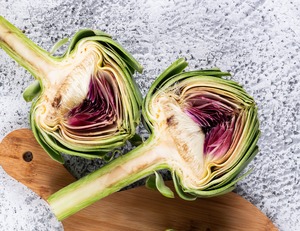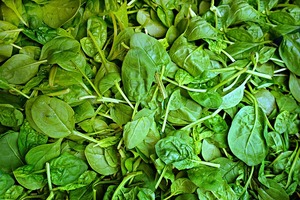In the world of healthy eating, artichoke and spinach soup has gained attention as a true nutritional powerhouse. This vibrant green soup is not only delicious but also packed with nutrients, making it an excellent choice for those looking to maintain or improve their overall health. With artichokes and spinach as the main ingredients, this soup is a simple yet effective way to enhance your daily nutrition. In this first part, we will explore the detailed nutritional profile of these two superfoods and the synergistic benefits of combining them into one powerful dish.
Nutritional Profile of Artichokes and Spinach
Artichokes: A Fiber-Rich Antioxidant Powerhouse
Artichokes are more than just a tasty addition to your meals. They are loaded with nutrients that provide a wide array of health benefits. Whether you’re looking to improve digestion, enhance detoxification, or maintain a healthy weight, artichokes offer essential nutrients to help you achieve these goals.
Key Nutrients in Artichokes
- Fiber: One medium artichoke contains around 7 grams of dietary fiber, making it an excellent choice for digestive health. Fiber is essential for regulating bowel movements and promoting a feeling of fullness, which can assist with weight management.
- Vitamins:
- Vitamin C: This powerful antioxidant supports the immune system and helps protect cells from oxidative damage.
- Vitamin K: Necessary for blood clotting and bone health, vitamin K is a key nutrient that artichokes provide.
- B-Complex Vitamins: These vitamins play a crucial role in energy metabolism and maintaining a healthy nervous system.
- Minerals:
- Magnesium: Supports muscle and nerve function while also playing a role in energy production.
- Potassium: Helps regulate blood pressure, making it vital for cardiovascular health.
- Phosphorus: Important for bone health and energy production, phosphorus is another essential mineral found in artichokes.
These nutrients work together to promote overall health, from supporting heart function to boosting the immune system. The high fiber content, in particular, makes artichokes a great addition to any diet, helping maintain satiety and digestive regularity.
Detoxifying Compounds in Artichokes

Artichokes also contain unique compounds that assist the body’s natural detoxification processes:
- Cynarin: Found almost exclusively in artichokes, cynarin is a chemical compound that stimulates bile production, aiding liver function and digestion. It also improves the absorption of nutrients and may even help lower cholesterol levels.
- Silymarin: Another powerful antioxidant, silymarin protects liver cells from damage and supports the body’s detox processes. Silymarin has also been shown to have anti-inflammatory properties, making it an important compound for overall health and wellness.
Fat-Burning Properties of Artichokes
Artichokes contain a unique type of fiber known as inulin, which offers multiple health benefits:
- Acts as a prebiotic, feeding beneficial gut bacteria.
- Increases satiety, helping with weight management by promoting feelings of fullness.
- May boost metabolism, making it easier to burn fat more efficiently.
Spinach: A Nutrient-Dense Superfood
Spinach is another vital component of this soup, offering an impressive array of vitamins, minerals, and antioxidants that contribute to overall health. Its versatility and nutrient density make it an essential food for any diet, particularly for those looking to improve energy levels, maintain strong bones, and support overall cellular function.
Essential Nutrients in Spinach

- Iron: A key component for energy production, iron in spinach helps transport oxygen throughout the body, boosting vitality and reducing fatigue.
- Vitamins:
- Vitamin A: Critical for eye health and immune function, vitamin A helps maintain healthy skin and mucous membranes.
- Vitamin C: Boosts immune function and aids in the absorption of iron, making it an important nutrient in spinach for combatting fatigue and boosting immunity.
- Vitamin K: Plays a key role in blood clotting and is vital for bone health.
- Folate: This B vitamin is important for DNA synthesis and cell division, making it essential for overall growth and development.
- Minerals:
- Calcium: Important for bone health and muscle function, calcium in spinach supports strong bones and teeth.
- Magnesium: Helps regulate muscle and nerve function and supports energy production.
Spinach is a nutrient-dense superfood that delivers a variety of essential vitamins and minerals. Whether you’re looking to improve energy levels or support bone health, spinach is a great food to include in your diet.
Detoxifying Compounds in Spinach
Like artichokes, spinach contains compounds that assist in the body’s detoxification processes:
- Chlorophyll: This green pigment offers several health benefits, including acting as a natural blood purifier. It supports the body’s ability to detoxify by neutralizing harmful substances and promoting overall cleansing.
- Lutein and Zeaxanthin: These antioxidants are known for their ability to protect eye health by filtering harmful blue light. They also reduce oxidative stress, which can help lower the risk of chronic diseases.
Metabolism-Boosting Components in Spinach
Spinach contains unique compounds known as thylakoids that offer several metabolism-boosting benefits:
- Appetite Suppression: Thylakoids can help regulate appetite by increasing feelings of fullness, making spinach an excellent food for weight management.
- Blood Sugar Regulation: These compounds support the regulation of blood sugar levels, which can help prevent spikes in blood glucose after meals.
Synergistic Health Benefits of Combining Artichokes and Spinach
When artichokes and spinach are combined in a soup, their individual health benefits are amplified. The combination of these two superfoods not only enhances nutrient absorption but also supports detoxification and offers protection against oxidative stress.
Enhanced Nutrient Absorption
When combined, artichokes and spinach offer a unique synergy that enhances nutrient absorption:
- Vitamin C in artichokes enhances the body’s ability to absorb iron from spinach. This is particularly beneficial for those looking to boost their iron intake and improve energy levels.
- The fat-soluble vitamins (A, E, K) found in spinach are better absorbed when eaten alongside the healthy fats present in artichokes.
This enhanced absorption allows the body to make the most of the nutrients available, ensuring that every bite of artichoke and spinach soup is packed with maximum health benefits.
Complementary Antioxidant Profiles
Artichokes and spinach each bring a unique set of antioxidants to the table:
- Artichokes provide cynarin and silymarin, which support liver health and aid in detoxification.
- Spinach offers lutein, zeaxanthin, and vitamin C, all of which help protect against oxidative stress and support overall cellular health.
Together, these antioxidants create a powerful combination that not only supports detoxification but also helps reduce the risk of chronic diseases by combating free radicals.
Amplified Detoxification Effects
Both artichokes and spinach support the body’s detoxification processes, but in different ways:
- Artichokes stimulate bile production, which is essential for liver function and detoxification.
- Spinach’s chlorophyll helps purify the blood, supporting the body’s natural detoxification mechanisms.
When combined in a soup, these two ingredients provide a more comprehensive detox boost, helping the body eliminate toxins and maintain optimal health.
How to Prepare Artichoke and Spinach Soup

Making artichoke and spinach soup is a simple yet satisfying process. Follow this step-by-step guide to create a delicious, nutrient-rich meal that can be enjoyed as a main course or a light appetizer.
Ingredients
To make a basic artichoke and spinach soup, you’ll need:
- 2 cans of artichoke hearts, drained
- 4 cups fresh spinach leaves
- 1 medium onion, diced
- 2 cloves garlic, minced
- 4 cups vegetable or chicken broth
- 1 cup milk or a plant-based milk alternative (such as almond or oat milk)
- 2 tablespoons olive oil
- Salt and pepper to taste
- Optional: 1 tablespoon lemon juice for added brightness, and grated Parmesan cheese for garnish
Step-by-Step Cooking Instructions
- Sauté the Aromatics: In a large pot, heat the olive oil over medium heat. Add the diced onion and sauté for 3-4 minutes, until the onion becomes soft and translucent. Add the minced garlic and cook for an additional minute, stirring frequently to avoid burning.
- Cook the Artichokes: Add the artichoke hearts to the pot and cook for about 5 minutes, allowing them to absorb the flavors from the onion and garlic. Stir occasionally.
- Add the Broth: Pour in the vegetable or chicken broth and bring the mixture to a gentle boil. Once boiling, reduce the heat to a simmer and let it cook for 15 minutes to allow the flavors to meld.
- Incorporate the Spinach: Add the fresh spinach leaves to the pot, stirring until they wilt, which should take about 2-3 minutes. Spinach cooks down quickly, so it doesn’t need much time.
- Blend the Soup: Using an immersion blender, puree the soup until smooth. If you don’t have an immersion blender, transfer the soup in batches to a traditional blender and process until creamy.
- Finish with Milk: Once the soup is smooth, stir in the milk or plant-based alternative. Heat the soup gently for an additional 2-3 minutes, but do not let it boil. Season with salt and pepper to taste.
- Add Final Touches: For an extra burst of flavor, add a squeeze of fresh lemon juice just before serving. Garnish with grated Parmesan if desired.
Tips for Maximum Nutrient Retention
To ensure you’re getting the most out of this nutrient-packed soup, it’s essential to follow a few simple cooking tips. These methods will help retain the vital nutrients that both artichokes and spinach offer.
Control Heat Levels
- Avoid High Heat: Cooking vegetables at excessively high temperatures can reduce the potency of some vitamins, particularly vitamin C and other water-soluble vitamins. Keep your soup at a gentle simmer to protect these nutrients.
- Add Spinach Last: Since spinach is delicate and can lose nutrients quickly when overcooked, add it towards the end of cooking. This will preserve its vibrant green color and retain its nutrient profile, especially its iron and vitamin K content.
Use Less Water
- Minimal Water for Cooking: Excessive water can cause nutrients to leach out into the cooking liquid. Since this is a soup, the broth will naturally contain the nutrients that seep from the vegetables, but using just enough liquid to cover the ingredients will help maintain nutrient concentration.
- Save the Artichoke Cooking Water: If you opt for fresh artichokes instead of canned, consider using the water you boil or steam them in. This nutrient-rich water can be added back to the soup for extra flavor and a nutrient boost.
Recipe Variations and Nutritional Enhancements
While the basic recipe is both delicious and nourishing, there are plenty of ways to customize it to suit your personal taste or nutritional needs. Here are some creative variations to try:
Protein-Packed Additions
For those looking to boost the protein content of the soup, consider adding:
- Cannellini Beans: These white beans are rich in fiber and protein, adding creaminess to the soup without the need for dairy. Simply add one can of drained beans to the broth before blending.
- Grilled Chicken: For a more filling meal, add shredded grilled chicken into the soup after blending. This addition makes the soup hearty enough to be a full meal.
- Tofu: For a vegan protein boost, add cubes of firm tofu to the soup just before serving. Tofu absorbs flavors well and increases the protein content significantly.
Extra Vegetables for Added Nutrients

Adding more vegetables can further enhance the nutrient density of the soup:
- Carrots: Add diced carrots at the same time as the artichokes. Carrots provide extra beta-carotene, an antioxidant that supports eye health and immune function.
- Celery: Celery adds a subtle crunch and additional vitamin K, which works alongside spinach to promote healthy bones and proper blood clotting.
- Leeks: Replace the onion with leeks for a milder flavor and an extra dose of prebiotic fiber to support digestive health.
Herb and Spice Boosters
Herbs and spices not only enhance the flavor of the soup but also provide additional health benefits:
- Turmeric: This bright yellow spice adds anti-inflammatory properties to the soup. A teaspoon of turmeric stirred into the broth can help support joint and immune health.
- Thyme: Thyme pairs well with artichokes and adds antibacterial and antifungal benefits to your meal.
- Rosemary: Rich in antioxidants, rosemary enhances digestion and supports cognitive health. Add a sprig while simmering the broth for a fragrant and flavorful twist.
Incorporating Artichoke and Spinach Soup into a Balanced Diet
This soup is not just nutritious but also versatile enough to fit into various dietary plans. Here’s how you can incorporate it into your meals for maximum health benefits:
Serving Sizes
- As a Starter: A portion size of 1 to 1.5 cups is perfect as a light starter before a main meal.
- As a Main Course: For a more substantial meal, 2 cups of soup paired with whole grain bread or a side salad makes for a satisfying lunch or dinner.
How Often to Consume
- Frequency: For optimal health benefits, aim to enjoy this soup 1-2 times a week. Its nutrient density makes it an excellent addition to a varied diet, particularly when alternated with other vegetable-based soups.
- Balance: While this soup is packed with nutrients, it’s important to pair it with other foods that provide complementary nutrients. Consider pairing it with whole grains, lean proteins, or additional vegetables to create a balanced meal.
Pairing Suggestions for Complete Meals
- Whole Grain Bread: Add a side of whole grain or sourdough bread to increase fiber and provide slow-digesting carbohydrates, which can help maintain steady energy levels.
- Grilled Protein: Pair the soup with grilled fish, chicken, or plant-based protein like tempeh for a well-rounded, satisfying meal.
- Salad: A simple mixed green salad with olive oil and lemon dressing complements the soup while adding even more vitamins and minerals to your meal.
Health Considerations and Precautions
While artichoke and spinach soup is generally very healthy, there are a few considerations to keep in mind.
Oxalates in Spinach
- Oxalates: Spinach is high in oxalates, compounds that can contribute to the formation of kidney stones in susceptible individuals. If you have a history of kidney stones, consider consuming spinach in moderation or substituting it with lower-oxalate greens like kale.
Potential Medication Interactions with Artichokes
- Blood Thinners: Artichokes are high in vitamin K, which can interfere with blood-thinning medications like warfarin. If you’re on such medications, consult your healthcare provider before increasing your intake of artichokes.
Allergies and Sensitivities
- Food Allergies: If you’re allergic to any ingredients in the soup, such as dairy, opt for plant-based milk alternatives and avoid any toppings that may trigger sensitivities.
Tips and Notes for Artichoke Spinach Soup
| Aspect | Tips and Notes |
|---|---|
| Nutritional Benefits | Artichokes and spinach are full of fiber, vitamins, and minerals that aid digestion and overall health. |
| Detoxification | Artichokes support liver function, and spinach’s chlorophyll cleanses the blood, promoting detox. |
| Weight Management | Artichokes’ fiber and spinach’s thylakoids help you feel full longer and reduce appetite. |
| Heart Health | Artichokes lower blood pressure, while spinach has antioxidants that protect the heart. |
| Bone Health | Both provide vitamin K for strong bones; spinach adds calcium for extra bone support. |
| Immune Support | Artichokes give vitamin C to boost immunity, while spinach adds iron for energy. |
| Metabolism Boost | Artichokes boost fat metabolism, and spinach helps regulate blood sugar levels. |
| Iron Absorption | Vitamin C from artichokes helps absorb spinach’s iron, improving energy. |
| Preparation Tips | Add spinach at the end of cooking to preserve nutrients and color. Simmer gently to keep vitamins intact. |
| Customization | Add beans for protein or herbs like rosemary for flavor. Use plant-based milk for a vegan option. |
| Oxalate Content | Spinach is high in oxalates. Use kale if concerned about kidney stones. |
| Serving Suggestions | Serve with whole-grain bread or a light salad for a balanced meal. |
| Allergen Considerations | Use gluten-free bread and dairy-free milk if needed. |
| Storage Tips | Refrigerate for up to 3 days or freeze in portions for later use. Reheat gently to preserve nutrients. |

